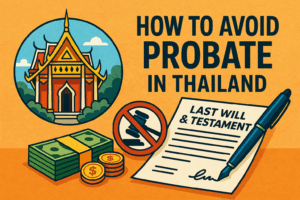Probate is the legal process of validating a will and distributing a person’s assets after death.
In Thailand, while probate may not be as formalized as in some Western countries, it still involves court procedures, especially when disputes arise or assets are significant.
For foreigners with property or investments in Thailand, avoiding probate in Thailand is crucial to minimize delays, reduce legal costs, and ensure assets are passed on smoothly.
Planning ahead can prevent unnecessary complications for your heirs.
In this article, we’ll explore key questions, including:
- Is probate required in Thailand?
- How long does probate take in Thailand?
- Is debt inherited in Thailand?
- What is the best way to avoid probate court?
- Why does avoiding probate in Thailand matter for expats?
If you are looking to invest as an expat or high-net-worth individual, which is what I specialize in, you can email me (hello@adamfayed.com) or WhatsApp (+44-7393-450-837).
This includes if you are looking for a free expat portfolio review service to optimize your investments and identify growth prospects.
Some facts might change from the time of writing. Nothing written here is financial, legal, tax, or any kind of individual advice, nor is it a solicitation to invest or a recommendation of any specific product or service.

Is There Probate in Thailand?
Thailand does not have a probate process identical to that in many Western countries, but it does have a legal procedure for administering a deceased person’s estate through the Thai court system.
Under Thai law, inheritance is governed by the Civil and Commercial Code, which outlines how assets are passed on when someone dies.
If the deceased has a valid Thai will, the executor (or administrator) named in the will must file a petition with the Thai probate court to be officially appointed.
This process allows the court to recognize the will and grant authority to the executor to manage and distribute the estate.
If there is no will, heirs must apply to the court to be appointed as administrators, and the estate is divided according to Thailand’s statutory inheritance rules.
In summary:
- Yes, there is a form of probate in Thailand, though it’s handled through civil court and often requires legal representation.
- Probate is required when property (such as land, bank accounts, or condos) is involved and needs to be legally transferred.
- Without court approval, Thai authorities will not allow the transfer of assets to heirs or beneficiaries even with a will in place.
This makes planning ahead critical, particularly for foreign nationals with assets in Thailand.
How Long Does Probate Take in Thailand?
Once submission of necessary documents and filling of petition are done, the court typically sets a hearing date within two months, but the timeline can vary widely depending on the complexity of the estate and the presence of a valid will.
What can cause a delay in probate?
- Whether a will exists: A clearly written, Thai-legal will speeds up the process, while dying intestate (without a will) introduces more legal steps and potential disputes.
- Disputes among heirs: Any disagreement among beneficiaries can delay proceedings significantly.
- Estate complexity: Multiple properties, offshore accounts, or foreign heirs can require more court involvement.
- Court backlogs: In busy jurisdictions, it may take longer to get hearing dates or final rulings.
For foreign beneficiaries, delays in probate can be especially frustrating.
Until probate is finalized, heirs may not legally access bank accounts, sell property, or manage the deceased’s affairs.
It can also increase administrative costs and create legal uncertainty, particularly if heirs live outside Thailand or if there are cross-border legal issues.
What Happens When a Foreigner Dies in Thailand?

When a foreigner passes away in Thailand, a combination of Thai law and international coordination comes into play.
The legal process can be complex, especially if the deceased held assets in Thailand or did not leave a Thai-recognized will.
Key steps and procedures include:
- Initial Reporting and Death Certificate
The death must be reported to the local Thai authorities, typically through the police or hospital, and a Thai-language death certificate will be issued. This is required before any legal processes can begin. - Role of the Embassy
The deceased’s home country embassy is usually notified. Embassies can assist in notifying next of kin, arranging for repatriation (if requested), and helping heirs understand the local legal framework. However, they do not handle probate or asset distribution. - Court Involvement
If the foreigner owned property or assets in Thailand, the probate process is usually handled by the Thai courts. If a will exists, the court will verify it and authorize an executor. Without a will, the court appoints an administrator according to Thai inheritance law. - Required Documentation
Heirs or legal representatives will need to present:- A certified copy of the will (if available)
- Proof of relationship (e.g., birth or marriage certificates)
- Identification documents (passport copies)
- A legal translation of all foreign-language documents into Thai
- Asset Transfer
Once the court authorizes probate or administration, assets such as bank accounts or property can be legally transferred to the heirs. This may require tax clearance and compliance with property ownership laws for foreigners.
Can You Inherit Debt in Thailand?
Yes. While heirs can inherit assets, they may also bear limited responsibility for the deceased’s debts, but only within clear legal boundaries.
Key points to understand include:
- Debts Are Paid from the Estate First
Before any assets are distributed to heirs, all outstanding debts of the deceased must be settled from the estate. This includes personal loans, credit card balances, unpaid taxes, and other liabilities. - Heirs Do Not Inherit Debt Personally
Thai law protects heirs from having to pay the deceased’s debts out of their own pockets. If the estate’s assets are insufficient to cover the debts, the remaining liabilities are written off; heirs are not personally liable. - No Inheritance Without Estate Value
If the estate has no net positive value after debts are settled, heirs may choose to reject the inheritance altogether. This protects them from engaging in a complex probate process for no benefit. - Executor’s Responsibility
The executor or court-appointed administrator must ensure that all legitimate debts are paid before distributing any inheritance. This includes verifying creditor claims and prioritizing them according to Thai law. - Legal Protections
Beneficiaries are entitled to clear accounting of the estate’s liabilities. If disputes arise, Thai probate courts can intervene to ensure fair treatment.
In short, while you cannot inherit debt directly in Thailand, any liabilities tied to the deceased must be resolved from their estate before you can access your inheritance.
What Is the Best Way to Avoid Probate Court in Thailand?
While Thai law doesn’t offer as many probate-avoidance tools as some common law jurisdictions, several practical strategies can still help.
- Joint Tenancy: In Thailand, holding property under joint tenancy with rights of survivorship allows the surviving co-owner to automatically inherit the property without going through probate. This is one of the most straightforward ways to avoid court intervention.
- Gifting Assets Before Death: Transferring ownership of assets while still alive can help reduce what’s included in the estate upon death. However, this should be done carefully to avoid unintended tax consequences or legal challenges.
- Creating a Valid Thai Will: Drafting a will that complies with Thai law is crucial. A properly structured Thai will can significantly streamline estate distribution and help avoid lengthy probate proceedings.
While not all probate can be avoided, using these strategies can significantly reduce the time, cost, and complexity involved.
Consulting with a local legal professional is highly recommended to ensure your estate plan aligns with Thai law.
What Is the Best Trust to Avoid Probate in Thailand?
Expats can make use of offshore trust structures to protect assets and steer clear of complications in avoiding probate in Thailand.
Here’s what to consider:
- Trust Structures Available for Expats:
Thailand itself does not have a domestic legal framework for setting up trusts for personal estate planning purposes. However, expats often establish offshore trusts in jurisdictions like Singapore, Hong Kong, or the Isle of Man. These can be legally effective for holding foreign assets, bank accounts, and investments. - Revocable vs. Irrevocable Trusts:
- Revocable trusts allow the grantor to retain control over assets during their lifetime and amend or revoke the trust at any time. These are flexible and ideal for those who want to retain control while still avoiding probate in Thailand.
- Irrevocable trusts, once established, cannot be easily changed. While they offer less flexibility, they provide stronger asset protection and estate tax advantages, especially for larger estates.
- Considerations for Thai Property and Investments:
Directly placing Thai property into a foreign trust is typically not permitted under Thai law. However, expats can hold shares in a company that owns property in Thailand within a trust, or use a trust to manage non-Thai assets while creating a Thai will for local holdings.
In summary, while local trust options are limited, offshore trusts remain a powerful tool for avoiding probate in Thailand particularly for assets held outside the country.
Why Avoiding Probate in Thailand Matters for Expats
For expats living in or holding assets in Thailand, navigating probate can be especially burdensome.
- Time, Cost, and Legal Hurdles: Probate in Thailand can take months or even years particularly when international heirs or foreign-held documents are involved. Legal fees, court procedures, and translation requirements can drive up costs and delay asset distribution.
- Risks of Dying Without a Plan: Without a valid Thai will or clear succession strategy, your estate could fall under intestate succession laws. This means your assets may be distributed in ways you didn’t intend, or worse, tied up in prolonged court proceedings.
- Peace of Mind Through Preparation: Proactively planning your estate via a Thai will, joint ownership, or appropriate offshore structures, ensures that your wishes are honored, your loved ones are protected, and unnecessary probate delays are avoided.
Pained by financial indecision?

Adam is an internationally recognised author on financial matters with over 830million answer views on Quora, a widely sold book on Amazon, and a contributor on Forbes.



